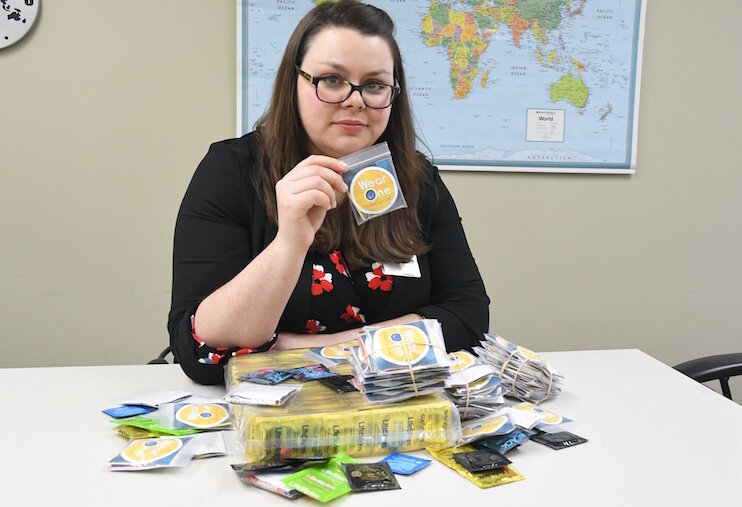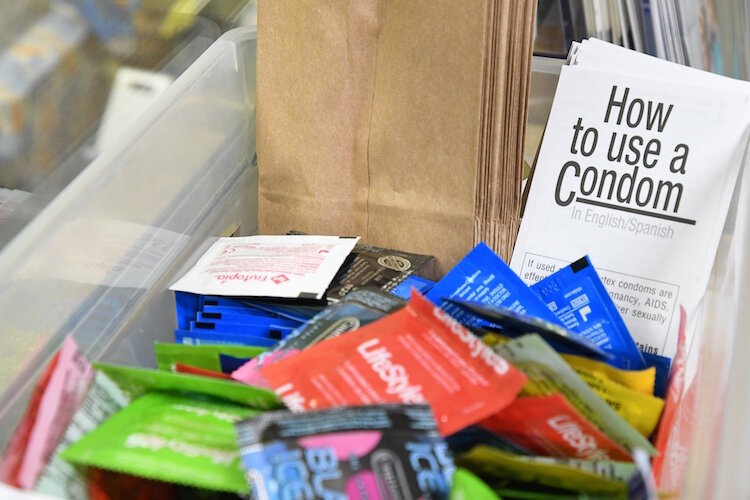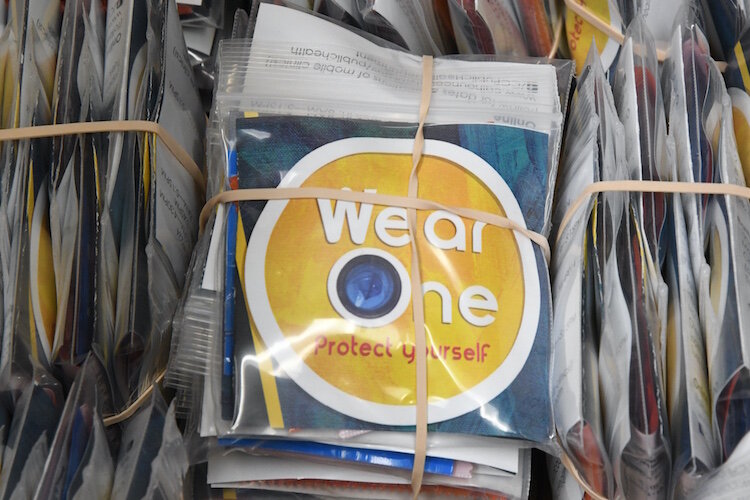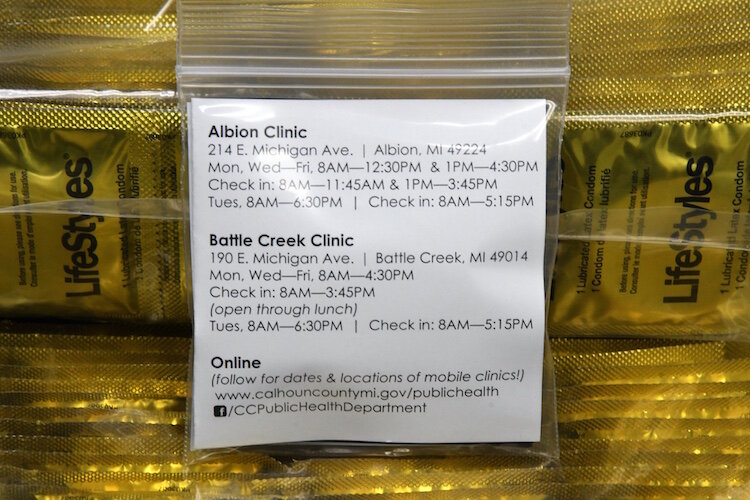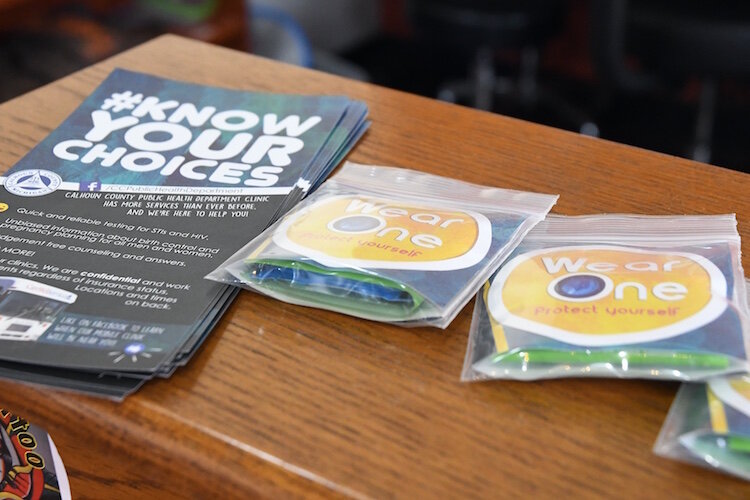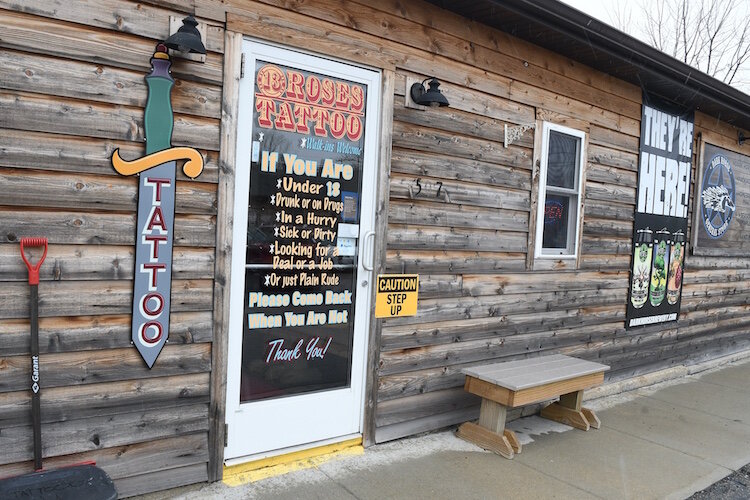Businesses in Battle Creek and beyond offer free condoms as part of ‘Wear One’ awareness initiative
With higher than average reports of sexually transmitted infections, Calhoun County encourages condom use with the "Wear One". They're free.
Editor’s note: This story is part of Southwest Michigan Second Wave’s On the Ground Battle Creek series.
Condom distribution is not in Kristin McDermott’s job description as a Health Educator with the Calhoun County Health Department.
But, once or twice a week she leaves her office at the Toller Building to deliver two to three dozen condoms to area businesses that have signed on to participate in a free condom program that has recently become available locally.
Known as “Wear One”, the initiative was developed to increase free condom availability, create awareness, and promote acceptance of condom use for people of all ages with the goal of decreasing Sexually Transmitted Infections and unplanned pregnancies.
County Health Educator McDermott says Calhoun County is the 40th county in Michigan to join the Wear One program. Ottawa County was the first. It came on board when the free condom program began under the auspices of the Michigan Department of Health and Human Services in 2014.
“It started here (in Calhoun County) at the end of January,” she says. “We’d been working to get it off the ground since May of last year. It’s a statewide initiative that pairs local health departments with local businesses to give people access to condoms without the stigma often associated with them.”
Too often, she says, “There’s this idea that what you’re preventing yourself from is a choice you’ve made and for whatever reason there needs to be a punishment for that decision you’ve made.” This “punishment” often takes the form of judgmental comments or nonverbal expressions that discourage sexually active individuals from purchasing condoms.
But, the real punishment is more likely to be an STI as a result of not using a condom. And the rates of STI’s such as gonorrhea and chlamydia in Calhoun County are higher than the state average, according to Health Department data.
The county had 315 cases of gonorrhea per 100,000 people in 2019 compared to a statewide rate of 172 cases per 100,000 people. McDermott says chlamydia cases in the county were at 775 per 100,000 people, with the statewide rate being 522 cases per 100,000.
McDermott says she’s not sure what is behind the higher than average STI rates in the county. “I’m really excited to see how we can reach out to the community and how we can impact these rates,” McDermott says. “Wear One gives the community better access to tools to stay safe.”
For those who remember them as STD’s, McDermott says there’s been a shift away from the term Sexually Transmitted Diseases to Sexually Transmitted Infections because of the stigma associated with the word “disease.”
“Infections are things that can be treated and cured where a disease is something where blame can be easily placed,” she says.
The use of condoms is one way to prevent the spread of STI’s. Clinics operated at the Health Department have free condoms available and offer a number of services, including tests for STI’s and HIV. The tests are available at little or no cost depending on an individuals’ ability to pay.
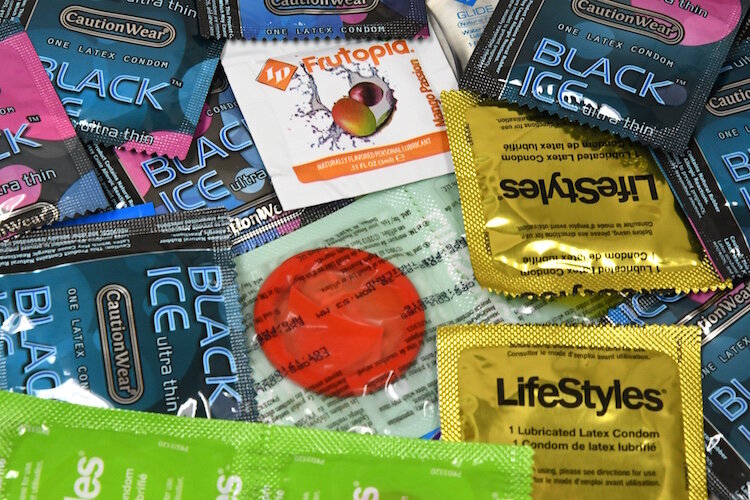
McDermott says people who come in for HIV testing can get their results within 20 minutes. Her department also has a pill available that reduces the chances of contracting HIV from sexual partners or through intravenous drug use.
Testing is conducted in a confidential manner and the Health Department staff works with clients to make sure they know they’re supported regardless of the test results, McDermott says.
“We also have our Choices program which offers reproductive services where people can come in to talk with our staff about when they’d like to start a family and how they can prepare for that,” she says.
Condom use may be a part of these discussions. McDermott says there are many reasons why people may not be using condoms, including the cost, the stigma, and lack of access.
“It’s still a pretty taboo subject out in the community,” McDermott says of condom use. “People tell us that they’re ashamed to seek them out.”
However, the businesses that have agreed to participate in Wear One are “unapologetically” on board, she says, and they maintain a supply of condoms in their bathrooms or other discrete areas to make it easier for people who want them to take them without anyone else knowing.
Each packet contains two condoms with instructions on how to use them and contact information for the county’s Health Department.
“It’s small, discreet packaging that you can put into a purse or pocket as you walk out of the bathroom,” McDermott says. “It meets you where you’re at.”
Deborah Dickerson, who works for Bernie’s Main Street Tavern in Homer, says the owners of the bar and restaurant wanted to make condoms available as a public service. She says many of their customers are college students and individuals who aren’t able to get to the Health Department to access the free condom program offered there.
“A lot of our customers think it’s a good idea,” Dickerson says. “We’ve had a few parents who know their kids are having sex take them to give to their kids.”
Not long after McDermott dropped off the first condom supply at Bernie’s, Dickerson says there was a customer in his mid-70s who asked if he could have several. “I was surprised because he can barely walk,” she says.
Equally as surprising was how quickly that first batch of 36 condoms, kept in the men’s and women’s bathrooms, disappeared.
McDermott says she decided to start the county’s Wear One initiative at bars and tattoo businesses “where people are more likely to go to have fun and may decide to have more fun after leaving” these places.
“Having that condom right there is a little hint to say, ‘pick me up,’” she says of the prophylactic, and adding that participating businesses receive a Wear One window sticker that they can display to let customers know free condoms are offered there.
The owner of 13 Roses Tattoo Studio in Marshall says McDermott didn’t have to say much to sell him on Wear One.
“They came in and asked me and I says ‘absolutely’. With my type of business, we see every type of person imaginable,” says 13 Roses owner Terry Brookland. “People feel comfortable when they come into the studio. We’re a different type of business and we don’t look down on people so they feel open to be themselves. Tattoo artists are like bartender/ psychologists because people tell us about their personal lives.”
The condoms at 13 Roses are kept in a reception area and Brookland says he has seen a lot go out the door and he was preparing to ask McDermott for more.
Eventually, McDermott says, she’d like to expand Wear One to any business that has an interest in erasing the stigma around protecting yourself and your partners by removing barriers such as cost, embarrassment, and lack of access.
She continues to set aside time to approach other businesses to encourage them to participate in Wear One. She says she’s gotten no pushback and business owners indicate to her that they clearly see a need for the free condom program which doesn’t ask questions or limit the number of condoms that an individual can have.
“If they take handfuls of them and see it as a joke, they’re still out there talking about condoms in the community,” McDermott says. “If individuals absolutely need that condom or they’re taking a bunch and maybe passing them on to a friend, I would rather 1,000 of condoms go out and find their intended use than nothing going out at all.”
For additional information about Wear One, click on publichealth@calhouncountymi.gov or call (269) 969-6482.

